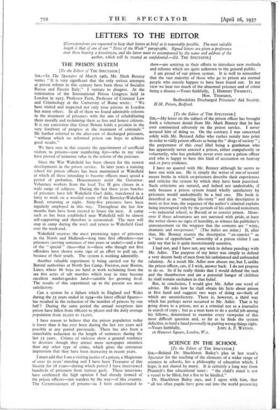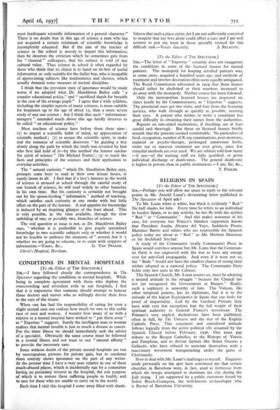SCIENCE IN THE SCHOOL
[To the Editor of THE SPECTATOR.] Six,—Behind Dr. Shackleton Bailey's plea in last week's Spectator for the teaching of the elements of a wider range of sciences in schools, lies a philosophy of education which, I hope, is not shared by many. It is certainly a long way from Plutarch's fine educational tenet : " the child's mind is not a vessel to be filled, but a fire to be kindled."
Dr. Shackleton Bailey says, and I agree with him, that " all too often pupils have gone out into the world possessing most inadequate scientific information of a general character." There is no doubt that in this age of science a man who has not acquired a certain minimum of scientific knowledge is incompletely educated. But if the aim of the teacher of science in the school is merely to impart this information, then he deserves the criticism which he sometimes gets from his " classical " colleagues, that his subject is void of any cultural value. Thus science in school is often regarded by those who think that its object is to hand on tit-bits of useful information as only suitable for the duller boy, who is incapable of .appreciating subjects like mathematics and classics, which usually demand some measure of mental discipline.
I think that the prevalent state of ignorance would be made worse if we adopted what Dr. Shackleton Bailey calls " a sounder educational policy," and " sacrificed depth for breadth in the case of the average pupil." I agree that a wide syllabus, including the simpler aspects of many sciences, is more suitable for beginners up to the age of about 13, than a more severe study of any one science ; but I think that such " information- mongery " extended much above this age hardly deserves to be called " an educational policy."
Most teachers of science have before them three aims : (1) to impart a scientific habit of mind, an appreciation of scientific method ; (2) to arouse the scientific spirit, to make real the romance of scientific discovery " by guiding a boy slowly along the path by which the truth was revealed by him who first laid hold of it—by this method the learner catches the spirit of science " (Sir Michael Foster) ; (3) to teach the facts and principles of the sciences and their application to everyday activities.
The " natural curiosity " which Dr. Shackleton Bailey says, prompts some boys to read in their own leisure hours, is surely latent in all. I find that if a boy's interest in the world of science is aroused at school through the careful study of one branch of science, he will read widely in other branches in his own time. But his curiosity is certainly not brought out by the spoon-feeding " informative " method of teaching, which satisfies such curiosity at one stroke with but little effort on the part of the learner. A real appetite for knowledge is induced by an inspiring glimpse of the feast ahead. This is only possible, in the time available, through the slow unfolding of one, or possibly two, branches of science.
The real question at issue is not, as Dr. Shackleton Bailey says, " whether it is preferable to give pupils specialised knowledge in two scientific subjects only or whether it would not be feasible to embrace the elements of " several, but it is whether we are going to educate, or to cram with snippets of























































 Previous page
Previous page